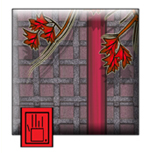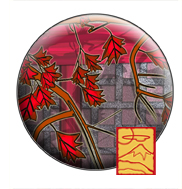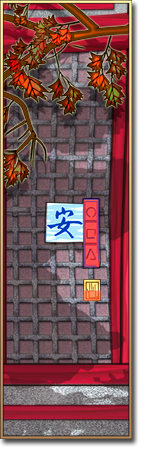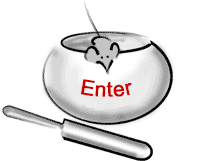On The Way: The Daily Zen Journal
Bhaddekaratta Sutta
The Sutra of Knowing the Better Way to Live Alone
Buddha

I heard these words of the Buddha one time when he was staying at the monastery in the Jeta Grove, in the town of Shravasti. He called all the monks to him and instructed them, “Bhikkhus!”
And the bhikkus replied, “We are here.”
The Blessed One taught, “I will teach you what is meant by ‘knowing the better way to live alone.’ I will begin with an outline of the teaching, and then I will give a detailed explanation. Bhikkhus, please listen carefully.”
The Buddha taught:
“Do not pursue the past.
Do not lose yourself in the future.
The past no longer is.
The future has not yet come.
Looking deeply at life as it is
in the very here and now,
the practitioner dwells
in stability and freedom.
We must be diligent today.
To wait till tomorrow is too late.
Death comes unexpectedly.
How can we bargain with it?
The sage calls a person who
dwells in mindfulness
night and day
‘the one who knows
the better way to live alone.’

“Bhikkhus, what do we mean by ‘pursuing the past’? When someone considers the way her body was in the past, the way her feelings were in the past, the way her perceptions were in the past, the way her mental formations were in the past, the way her consciousness was in the past; when she considers these things and her mind is burdened by and attached to these things which belong to the past, then that person is pursuing the past.
“Bhikkhus, what do we mean by ‘not pursuing the past’? When someone considers that the way her body was in the past, the way her feelings were in the past, the way her perceptions were in the past, the way her mental formations were in the past, the way her consciousness was in the past, when she considers these things but her mind is neither enslaved by nor attached to these things which belong to the past, then that person is not pursuing the past.
“Bhikkhus, what is meant by ‘losing yourself in the future?’ When someone considers the way his body will be in the future, the way his feelings will be in the future, the way his perceptions will be in the future, the way his mental formations will be in the future, the way his consciousness will be in the future; when he considers these things and his mind is burdened by and daydreaming about these things which belong to the future, then that person is losing himself in the future.
“Bhikkhus, what is meant by ‘not losing yourself in the future?’ When someone considers the way his body will be in the future, the way his feelings will be in the future, the way his perceptions will be in the future, the way his mental formations will be in the future, the way his consciousness will be in the future; when he considers these things and his mind is not burdened by or daydreaming about these things which belong to the future, then he is not losing himself in the future.
“Bhikkhus, what is meant by ‘being swept away by the present’? When someone does not study or learn anything about the Awakened One, or the teachings of love and understanding, or the community that lives in harmony and awareness, when that person knows nothing about the noble teachers and their teachings, does not practice these teachings, and thinks, ‘This body is myself, I am this body; these feelings are myself, I am these feelings; this perception is myself, I am this perception; this mental formation is myself, I am this mental formation; this consciousness is myself, I am this consciousness,’ then that person is being swept away by the present.

“Bhikkhus, what is meant by ‘not being swept away by the present’? When someone studies and learns about the Awakened One, the teachings of love and understanding, and the community that lives in harmony and awareness, when that person knows about noble teachers and their teachings, practices these teachings, and does not think ‘This body is myself, I am this body; these feelings are myself, I am these feelings; this perception is myself, I am this perception; this mental formation is myself, I am this mental formation; this consciousness is myself, I am this consciousness,’ then that person is not being swept away by the present.
“Bhikkhus, I have presented the outline and the detailed explanation of knowing the better way to live alone.”
Thus, the Buddha taught and the bhikkhus were delighted to put his teachings into practice.
Buddha
Commentary – What does it mean to Live Alone?
The Sutra on Knowing the Better Way to Live Alone is called the Bhaddekaratta Sutta in Pali. It is number 131 in the Majjhima Nikaya. This important sutra is one of the oldest written teachings on how to live in the present moment.
“Knowing how to live alone” doesn’t mean you have to live in solitude in a cave, separated from other people. If we sit alone in a cave, lost in our thinking, we aren’t really living alone. “Living alone” means living to have sovereignty over ourselves, to have the freedom that comes from not being dragged away by the past, not living in fear of our future, and not being pulled around by strong emotions caused by the circumstances of the present.
When we are masters of ourselves, we can grasp the situation as it is, and we’re in the best position to handle whatever may arise. When we dwell in mindfulness day and night, then we are truly practicing “the better way to live alone.” This is true whether we are surrounded by friends and family, or when we are living a solitary life.
~ Thich Nhat Hanh
Source – Awakening the Heart – Essential Buddhist Sutras and Commentaries – Thich Nhat Hanh 2012





This is a very simple and essential teaching of the Buddha on how to live fully in the present. Today, many call this mindfulness, but like so many other namings, the word can lose its meaning with our overuse of it.
And the “practice” of mindfulness, like any other teaching can become mechanical. If there were no method of teaching how to live fully in the present, what would it feel like?
Without anyone telling you how that is, without using any catchy phrases to “help” us, feel it directly for yourself. Take away our props and what do we have? Isn’t there an innate sense of connection that also guides us into understanding and naturally suggests the Eightfold Noble Path?
Not lost in the past, not dreaming in the future, just responsive to the here and now and able to bring all our experience from the past, if needed, to fully engage the present, yes, how does that feel?
The expression “a better way to live alone” is a bit misleading. Since the Buddha is not talking about literally separating ourselves from others and living in a cave, really, what does this phrase mean?
It took a few readings before I realized a kind of figure/ground experience with this phrase. Instead of living alone, suddenly it became Living alone. The bare bones experience of Living/Being in and of itself speaks more clearly of this teaching.
For one of the shortest and oldest sutras, this is one we can absorb and spend our lives maturing with.
Sitting with bare bones and ashes,
Elana, Scribe for Daily Zen